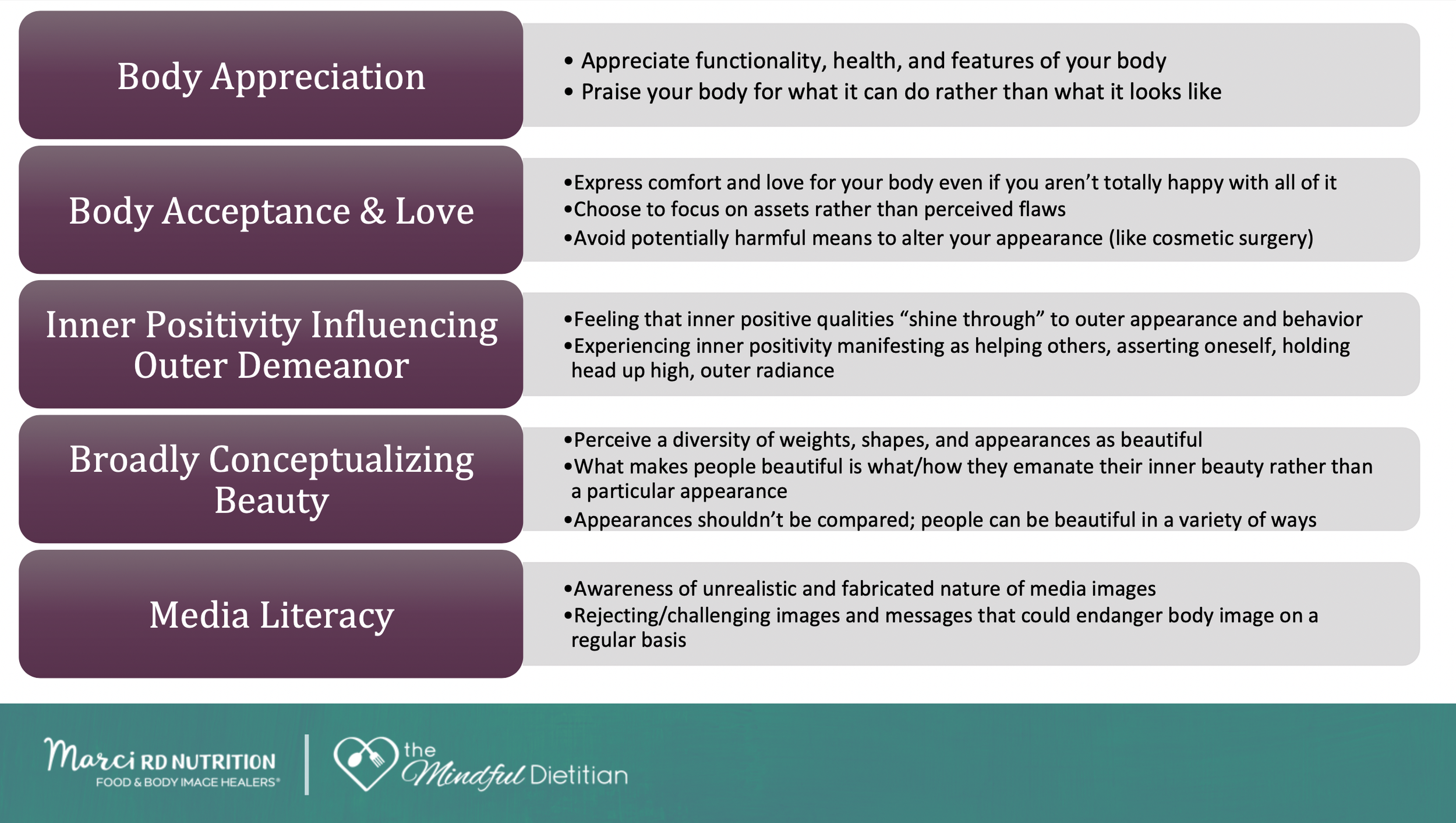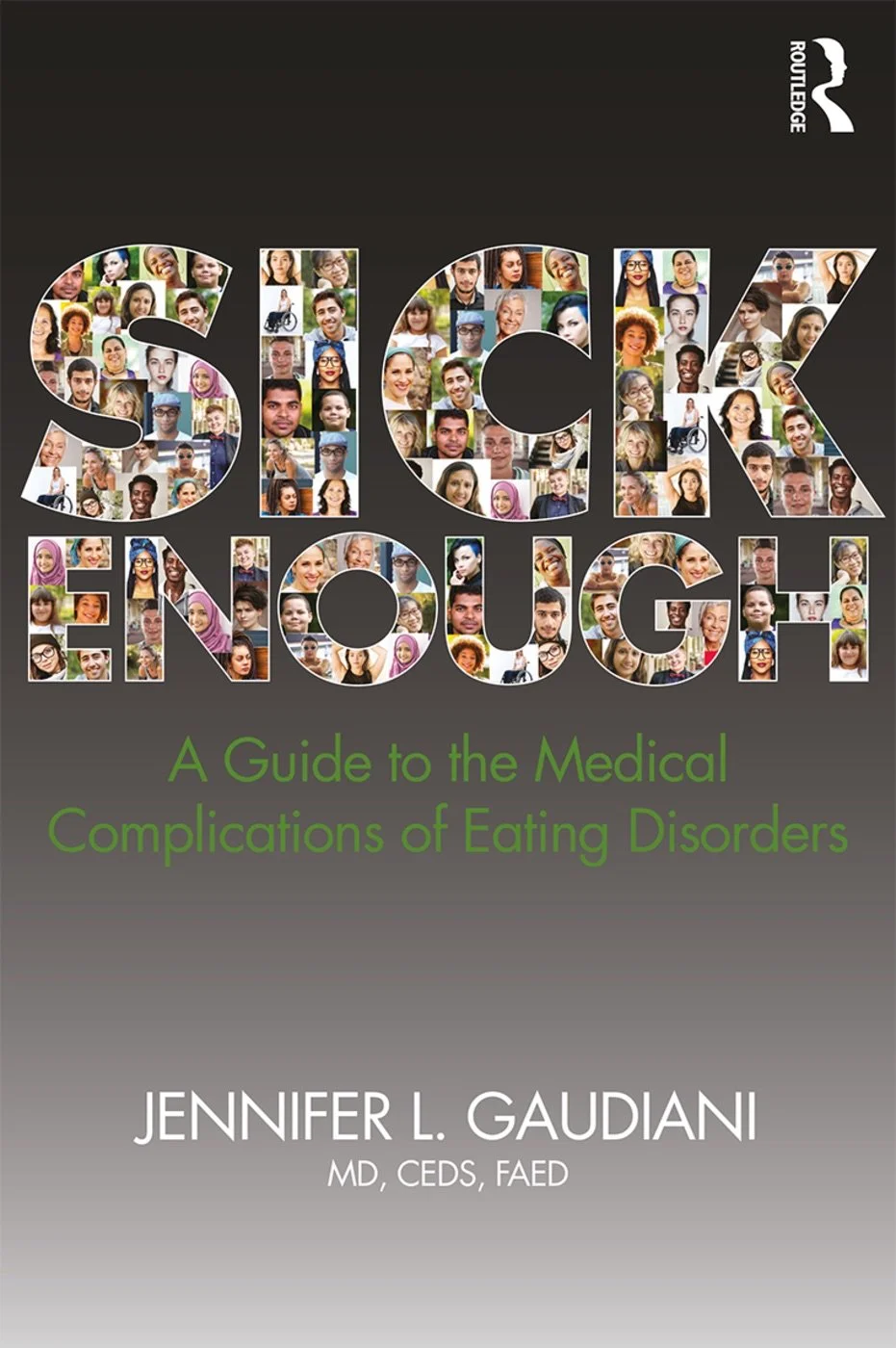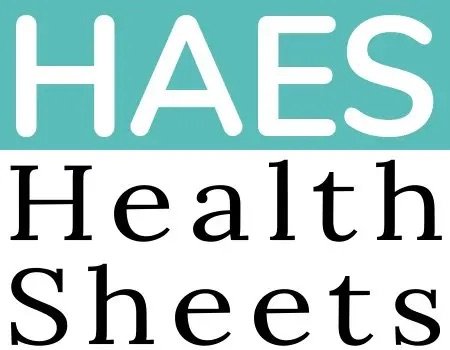
Resources: Eating Disorder Recovery and Intuitive Eating
An ever-growing list of websites, books, podcasts, and more to supplement nutrition counseling and other services.
Body Image
Positive body image is “loving and accepting our bodies regardless of appearance and functioning, showing compassion for differences and difficulties, and responding effectively when body image distress occurs” (taken from the Positive Body Image Workbook below). Body image work is the ongoing process of being in relationship with your body and moving towards allowance, connection, and ”being with” the body instead of “doing to” it.
-

The Wisdom of the Body
This book by Dr. Hillary McBride describes the concept of embodiment—what it means to be in the body. It touches on how the body relates to trauma, pain, body oppression, body image, feeling emotion in the body, spirituality and more.
-

How to Let Go of Your Struggle with Body Image Using ACT
Learn how to use Acceptance and Commitment Therapy (ACT) to navigate negative thoughts, feelings, and urges about your body. ACT is an approach I use in session and involves mindfulness and living according to your unique values.
-

Positive Body Image Workbook
A detailed and evidence-based guide to understanding and improving body image by researchers and clinicians Wood-Barcalow, Tylka and Judge. It includes topics and assignments about embodiment, body appreciation, self-care, intuitive eating, social comparison, and body talk. This is a great resource for clinicians too!
-

Pillars of Positive Body Image
This handout by RDs Fiona Sutherland and Marci Evans is a summary of the components of positive body image. These are evidence-based choices you can make to improve your body image without having to change your body!
-

Body Trust Website
Sign up for their weekly “Body Trust Tuesday” emails for brief and powerful inspiration. Center for Body Trust “is dismantling systemic weight stigma and providing education and support for healing relationships with our bodies.” Explore their other offerings including their new book, community courses and retreats.
Understanding Diet Culture
We live in a system that worships thinness, equates health with weight, and demonizes/glorifies certain foods. Over time, this can result in our own personal diet mentality - that voice in your head that evaluates and judges based on what you eat and how you look. These resources explore the defining characteristics of diet culture and its consequences.
-

Anti-Diet by Christy Harrison
The majority of this book describes how diet mentality steals your time, money, wellbeing, and happiness. Then it reviews how you can move beyond diet culture.
-

Weight Science: Evaluating the Evidence for a Paradigm Shift
This academic article published in Nutrition Journal challenges the assumptions that are made in weight loss recommendations and presents the perspective of Health At Every Size®.
Nutrition and Intuitive Eating
The following resources provide guidance on how to tune into internal cues, find satisfaction in food and eat to nourish your body without stressing over numbers like calories, points, pounds, etc.
-

Intuitive Eating by Tribole and Resch
An updated version of the book where the concept of intuitive eating originated. It’s divided into chapters based on each of the 10 principles.
-

Gentle Nutrition by Rachel Hartley
This book provides a great summary of intuitive eating with a primary focus on the last principle, Gentle Nutrition or “how to approach nutrition in a flexible way, with the goal of promoting wellbeing.” A large portion of the book includes recipes.
-

Nutrition Matters Podcast
There’s so many great podcasts out there and I’m specifically posting Nutrition Matters with Paige Smathers, RDN, CD as a favorite when it comes to intuitive eating. Most of the 182 episodes include a guest speaker on a broad range of topics pertaining to nutrition and healing from eating disorders and related issues. Paige is quick to get to the meat of the matter, reminds us of the nuances in IE and offers a gentle and compassionate approach to the anti-diet world.
Physical Health
There are ways to care for physical health that are flexible, balanced, kind, and inclusive of all types of bodies and backgrounds.
-

Sick Enough by Dr. Gaudiani
Unfortunately, many clients believe they aren’t “Sick Enough” to warrant addressing their disordered eating behaviors because their weight isn’t “low enough” or their labs look fine. Author Dr. Gaudiani writes “I wrote this book for those who have an eating disorder or who have been on diets and want to know what might be happening in their bodies as a result. They might have been invalidated or even harmed by the medical system for years. They might have medical issues that are hard to measure and thus hard to diagnose and treat…”
-

HAES Health Sheets
A library of information for common health conditions that is weight-neutral and evidence-based. Conditions include heart disease, high blood pressure, high cholesterol, joint pain, joint replacement, NAFLD, obstructive sleep apnea, osteoarthritis, Polycystic Ovarian Syndrome (PCOS), and Type 2 Diabetes.
-

Determinants of Health
An interactive visualization of the factors that determine a person’s health. This tool shows the percentages that individual behavior, genetics, environment, social components and medical care have on your health. Notice which factors you can control, and which are outside of your control.
Eating-Disorder Specific
Everything on this resource page can be helpful to eating disorder recovery, but the following resources are a bit more specific to anorexia, bulimia, binge eating disorder and OSFED.
-

CCI Handouts
A list of CBT self-help handouts based on the following topics: nutrition, physical health, body image, and key psychoeducation points for eating disorders. Specific handouts to check out are Set Point Theory, Why Diets Don’t Work, and Eating Disorders & Neurobiology.
-

8 Keys to Recovery from an Eating Disorder
A practical book filled with relatable stories from the authors’ own struggles and plenty of journal prompts to process your own story. Some examples of the “keys” are Motivation, Peace and Hope; It’s Not About the Food; Feel Your Feelings, Challenge Your Thoughts; and Reach Out to People Rather Than Your Eating Disorder.
Mindfulness
Jon Kabat-Zinn’s definition of mindfulness is “awareness that arises through paying attention, on purpose, in the present moment, non-judgementally.” This is what we strive to do in nutrition counseling for intuitive eating and eating disorder recovery.
-

Insight Timer App
The best free app with meditations from meditation teachers, mental health counselors, and amateurs. Use the search bar to find guided meditations specific to your needs, such as “hunger” or “body image.” Need less guidance? You can set up your own timers with your choice of bell tones at your choice of intervals for a silent meditation.
-

Self-Compassion
Self-compassion involves shared humanity, mindfulness, and self-kindness. It’s how you would treat a friend who is suffering or having a hard time. Kristen Neff’s website offers information about self-compassion, related meditation recordings and book offerings.
-

Mindful Self-Care Quiz
How in tune and responsive are you to your physiological and emotional needs? Take this assessment to see how you rate in six various areas of self-care including supportive structure, relationships and mindful self-awareness. Explore the rest of Dr. Catherine Cook-Cottone’s website to understand how her model of embodied self-regulation fits in with mindful self-care.
Size Inclusivity and Social Justice
All bodies are good bodies worthy of care and respect.
-

The Association for Size Diversity and Health
“As a non-profit organization with an international membership committed to the practice of the Health At Every Size® (HAES®) Principles, ASDAH envisions a world that celebrates bodies of all shapes and sizes, in which body weight is no longer a source of discrimination and where oppressed communities have equal access to the resources and practices that support health and well being.”
-

Fearing the Black Body; the Racial Origins of Fat Phobia By Sabrina Strings
Professor and author Sabrina Strings uses historical art and scientific literature to illustrate how fat phobia originated from the false belief that fatness was associated with inferior race. It wasn’t until after this cultural belief was established that the medical community claimed that higher weights were unhealthy.
-

Weight Stigma Article
This opinion article reviews evidence that the effects of weight stigma are actually more harmful to health than BMI measures. It challenges healthcare providers to be the ones to make changes by recognizing bias and providing weight-inclusive care.